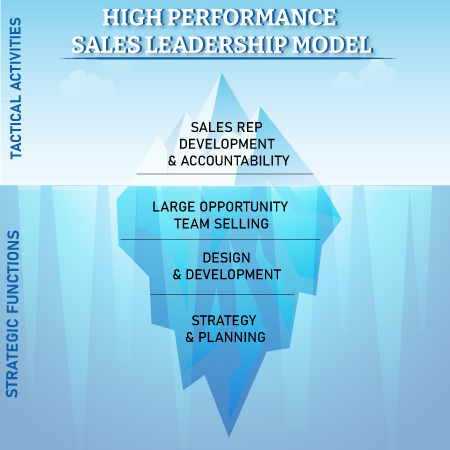As a top executive, you know that sales are critical to your company’s success. If you are the person leading your sales team then you know how much time and energy it takes, not to mention that you still have other critical aspects of the business to oversee.
You might be wondering if it’s time to hire a sales manager – but how do you know if you’re ready?
Many of my clients find me at this crossroad in their business. As a Fractional Sales Leader, I can be helpful in a variety of ways. I can be a sounding board while you assess what your salespeople need to perform at a higher level. When you are ready to bring in a full-time sales manager, I can help you source, screen, and secure the right person. Most importantly, I can help you understand your company’s readiness to make the most out of investing in a dedicated sales manager.
So, before you have HR set-up a job posting to start looking for your new head of sales, take a moment to review the scenarios below.
My objective in this article is to shed light on settings I commonly see that justify hiring an executive-level Fractional Sales Leader before a long-term Sales Manager. Preparing your company’s growth structure while you undergo what can be a lengthy search process for one of the most important hires you are going to make pays off ten-fold.

I understand that various growth phases can be both exciting and overwhelming. I have worked with many companies in similar situations and helped them make the right decisions at the right time. Schedule a short exploratory call to gauge how I may be able to help by contacting me at smuniz@salesxceleration.com.
SCENARIO 1: You need to free up your time immediately.
Managing a sales team and running your company are two different roles. Even so, it’s common that the owner or top executive wears both hats during a business’ various growth stages.

If you’re starting to feel spread too thin, it’s important not to rush when establishing the right staffing plan to take the sales load off your shoulders.
The stakes are too high.
Adhering to a diligent hiring process takes time. For a high impact hire like a sales manager in the currently compressed employment market, it is not uncommon that it could take 6-12 months to get the right candidate on board.
This involves a series of pre-hire, hiring, and pre-start activities to avoid a ton of lost time, money, and internal distraction. Not to mention the objective of getting your new candidate off on the right foot to not only grow revenue but reduce the risk of them not working out.
If your company’s growth demands require you to be freed up quickly to work “on the business”, my Fractional Sales Leader model is a viable solution. To gain an understanding of how it works, review my previous articled called, “How Much of My Time Is Needed If I Hire a Fractional Sales Leader?”.
SCENARIO 2: You don’t have a proven sales platform in place.
You know when activity in your sales department hits the point that it needs a dedicated resource to drive results to the next level. What isn’t clear is whether your company is ready for a full-time sales manager to make the right impact.
A common misstep is not recognizing the differing strategic vs. tactical sales leadership skills that are needed to set up a company for scalable success.
Hiring a full-time executive level sales leader with the full gamut of experience is costly and unnecessary for most small and mid-sized businesses. Creating an effective sales platform requires the full breadth of strategic and tactical skills, but you don’t necessarily need all of those skills to be an effective sales manager.

This is why “the right fit” is almost always two different resources, at different times.
An interim sales leader with an executive-level background can be your secret weapon to establish strategic positioning, proven sales methodology, and structure/systems essential in taking your business to the next level. Utilizing the skills and expertise of a seasoned expert early on can be crucial for success and quickly establish the reliable foundation needed to fuel sustained, long-term growth.

After that, a dedicated sales manager with exceptional tactical skills becomes a high-impact resource to drive sales growth long-term.
No matter who runs your sales team, you need an established sales process and methodology to scale your sales team and results.
By establishing this fundamental framework before you add a full-time sales manager to your staff structure, you shorten their ramp time and enable them to hit the ground running. This alone can save several months of sub-par sales productivity which impacts the entire sales team.
SCENARIO 3: You're not sure how to structure for growth
Growing and structuring your sales team can be challenging, especially in competitive markets. There are some key signs to look for that may indicate it’s time to make changes.
For instance, slowing revenue can be a sign that you need to rethink your sales strategy and its associated selling roles.
Or, perhaps you’ve noticed an increase in competition — this could mean more resources and staff are needed to increase, or even hold on to, your market share.

Just as in other areas of your business, “Right People, Right Seats” will need to continually evolve in the sales department as strategy is adjusted to reach next level growth goals.
How you organize your sales team depends on a myriad of factors. First you must consider the unique make-up of your sales environment.
Start by asking yourself these foundational questions:
- Does my product fit into multiple verticals?
- What is the level of complexity of my product and sales process?
- Which industries will my new accounts come from?
- What percentage of my business is coming from returning customers vs new?
- How broad are the geographic regions or territories my team focuses on?
- …and many more!
Establishing sales organization structure and how it needs to evolve to support growth is an executive level sales leadership function. I have helped businesses for decades find the alignment they needed to meet their sales growth goals while keeping their current customers secured.
It is critical to have all aspects of sales strategy nailed down before hiring a sales manager whose background is traditionally centered in executing on established plans, not developing them.
Key Takeaways
If any of these scenarios resonate with you, it may be time to consider hiring a Fractional Sales Leader to pave the way to readiness for a full-time sales manager over time.
Hiring the wrong sales leader or plugging them into an environment that is not ready to scale is an expensive and risky situation that I can help you avoid.
When should you hire a Fractional Sales Leader before a full-time Sales Manager?
- When you need to free up time quickly to focus on the rest of your business
- When you don’t have a proven sales platform in place.
- When you aren’t sure your environment is set-up for a sales manager to be successful
- When your sales strategy is no longer working, and you aren’t sure how to fix it
- When you aren’t experienced structuring your sales team for growth
——————————————————————————————
I am part of a national group of Senior Sales Leaders who collaborate to share insights like the examples shown in this article. We formed because of our shared passion to help business leaders exponentially grow their revenue.

